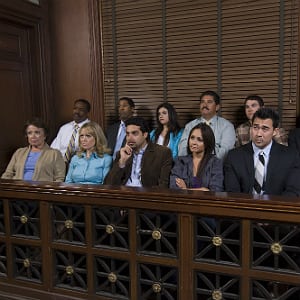Last week, Banville Law discussed the extreme likelihood that a personal injury lawsuit will end in a settlement. 95% of legal disagreements do, which means that plaintiffs and defendants almost universally reach an agreement long before anyone sees the inside of a courtroom. We ended that post by discussing several forms of "Alternative Dispute Resolution," ways of reaching that agreement.
But obviously, some cab accident lawsuits do make it to court. And if you were injured in a taxi crash, you're probably wondering what a court case will look like. It might even be your biggest fear. In the coming months, our cab accident lawyers will try to present an accurate picture of the legal process: from discovery to appeals. Not sure what those terms mean? Keep reading to find out.

But before we dive into the nitty-gritty details of a lawsuit, there are some preliminary definitions we need to get out of the way. We already mentioned the first: the difference between jury and bench trials.
A jury trial is that classic image we all share of a lawsuit: 12 men and women sitting behind a bench, reviewing the facts of a case. It's Jimmy Stewart in Anatomy Of A Murder or Denzel Washington in Philadelphia (and sometimes, just as dramatic; both of those fictional cases were based on true stories).
Every lawsuit is based on two interdependent sets of considerations: "questions of fact" and "questions of law." Questions of fact? That's what you say happened. It's a story that explains the accident and accounts for your injuries. Both sides will tell their own version of the story, and try to prove it with evidence. This is the jury's job. They look at all the evidence and decide which story seems more likely to be true. In a jury trial, juries decide questions of fact.
Then there's the law. The law tells us what we can rightfully do in court. This is a procedural question. Can the defendant's lawyer say that? Can they phrase a question in that way? In a jury trial, judges keep tabs on questions of law. But ultimately, the jury makes a decision as to which side's argument is more convincing.
Bench trials take juries out of the picture. Evidence is raised, and arguments are made, directly to a judge, who acts both as "finder of fact" and makes "conclusions of law." They handle both sets of questions and, in the end, decide what happens.
By default, civil lawsuits in most state courts are sent to the bench, not a jury. But either party, defendant or plaintiff, can request a jury trial if they think it may lead to a more beneficial outcome. Why would they do that?
When you look at the statistics, this decision, between bench or jury, makes a huge difference. In jury trials, 53.2% of all civil suits were won by plaintiffs. In bench trials, an astounding 65.7% of cases were awarded to plaintiffs.
But that doesn't mean that you should always be pushing for the bench.
Bench trials are a lot faster than jury ones. You eliminate the jury selection process entirely, and one person making up their mind is usually a lot faster than multiple people coming to some sort of consensus. This can be a plus for both defendants and plaintiffs, who usually want to save money on court fees if possible.
In most cases, judges know a lot more about the law than jury members do. And while a judge's main job during a jury trial is to inform jury members on matters of the law, subtleties can still fall by the way-side. If a particular side's argument is really technical and likely to sail over a jury's heads, they'll probably opt for a bench trial.
Judges are also less likely to succumb to emotional arguments, ones that tug on your heartstrings and (sometimes) leave reason behind. If either side has a sympathetic case, they'll most likely want a jury trial.
As you can see, the decision to pursue either a bench or jury trial is very particular. It will depend on numerous factors specific to your own case, and the nature of your accident. Consult with an experienced cab accident lawyer to learn which form of trial is best in your situation.